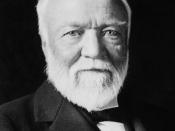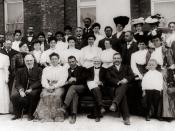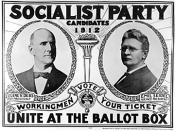The late nineteenth century was a period of rapid industrialization and extreme economical expansion and wealth for America. Many businessmen such as J.P. Morgan, John D. Rockefeller and Cornelius Vanderbilt among others reached the pinnacle of wealth and amassed huge amounts of money. Many individuals developed contrasting attitudes and views on this newly created wealth. Among these individuals were Andrew Carnegie, Eugene V. Debs, and Booker T. Washington. Seemingly similar people, and yet they were almost completely different. One was a well-known philanthropist who was one of the richest men in world, another was an educator and an advocate of Black advancement and the last a socialist and labor activist (Encarta). Their attitudes on the wealth of America during the late nineteenth century may have looked different, since they seemed to be completely different people and with different attitudes on wealth. But in reality, all of these three men's attitudes toward the wealth created in America during the late nineteenth century were exactly the same: they all believed that this huge, new wealth should be redistributed back into society's most needy areas.
Andrew Carnegie (1835-1919) was one of the most famous American philanthropists and industrialists (Encarta). He was a Scottish immigrant who had worked his way up from "rags to riches" in the railroad and steel industry. And by 1901, he was one of the richest men in the World and one of the few men who actually achieved the American ideal of "rags to riches" (Brinkley, Alan, et al 518). He amassed a huge fortune in the steel industry and in 1901 simply quit the business life and lived the rest of his life as a philanthropist. Following the principles laid down in his book, The Gospel of Wealth, Carnegie donated over $300 million back to society, primarily...



Caer
A brilliant essay
you have stated your points and backed them up with references
good structure
KEEp up the good work
2 out of 2 people found this comment useful.